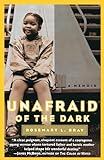This had dropped out of my active memory until this morning brought an email from the new president of Starr King School for the Ministry, the Rev. Rosemary Bray McNatt. She’s quite a good writer. If you haven’t read her memoir, you’re missing out:

You shouldn’t miss the email, either. This is the paragraph that jumped out at me:
I thank both Elaine McArdle of UU World and Mark Oppenheimer of The New York Times for giving us at Starr King the opportunity to speak about our school. Unfortunately, these articles were not as objective or positive as I had hoped. Each of the articles contains several factual inaccuracies and mischaracterizations that paint the school, members of our community and our efforts toward resolution in an inaccurate and unfair light. Even more distressing, these two articles have caused anxiety, distress, fear, and hurt to members of our Starr King community. I am saddened that these articles have reopened a wound that, for many at Starr King and in our larger progressive religious community, had not yet healed.
There are three things to find objectionable in this paragraph.
First, if there are factual inaccuracies in these stories in UU World and The New York Times, I’d like to have them enumerated for correction. I’d also like to have the stories linked from the email so I can easily read them for myself and make up my own mind.
Second, I am troubled by the claim that causing “anxiety, distress, fear, and hurt to members of our Starr King community” is more distressing than “factual inaccuracies and mischaracterization” about Starr King (and by extension Unitarian Universalism) appearing in the national media. I don’t mean to diminish any worries some members of the Starr King community experience, but I also can’t regard them as more important than the rest of Unitarian Universalism, or even the rest of the Starr King community.
Third and finally, I am sick and tired generally of loose and irresponsible talk about wounds and the healing process. The use of such language here is a prime example. Is this a “reopened” wound? Starr King may want to move on and heal up, but must I privilege their point of view? There are others who have been wounded in this process. Do they feel it’s time for healing? Possibly they feel the wounding process is still going on. Perhaps they would like calls for healing to be preceeded by taking the knife out of the wound.
I’ve been trying not to take sides on this, but it’s getting harder to watch. From here, it sounds like every other story about powerful people doing stupid things, a problem so acutely experienced in academia, especially when student rights are set against administrative expedience. My rule of thumb in dealing with administrators when I was a student was they they lie more easily than they breathe and cannot be trusted. My greatest regrets include trusting them from time to time and getting screwed.
And yet, that’s how most administrative practice works. It’s designed for a result and what looks like trampling underfoot is often just motion along the straightest line. And I’m clearly biased in favor of students. So I don’t know, but this all smells very bad.
What do you think?
